

When economic theory fails the maths exam. But our arguments were ignored by the economics profession because, according to mainstream economic theory, private debt should have no impact on aggregate demand.
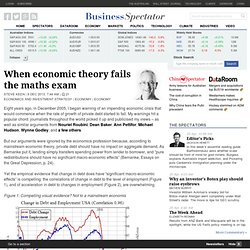
As Bernanke put it, lending simply transfers spending power from lender to borrower, and “pure redistributions should have no significant macro-economic effects” (Bernanke, Essays on the Great Depression, p. 24). Yet the empirical evidence that change in debt does have “significant macro-economic effects” is compelling: the correlations of change in debt to the level of employment (Figure 1), and of acceleration in debt to changes in employment (Figure 2), are overwhelming.
Figure 1: Compelling visual evidence? Evidence for Unintentional Emotional Contagion Beyond Dyads. Little is known about the spread of emotions beyond dyads.

Yet, it is of importance for explaining the emergence of crowd behaviors. Here, we experimentally addressed whether emotional homogeneity within a crowd might result from a cascade of local emotional transmissions where the perception of another’s emotional expression produces, in the observer's face and body, sufficient information to allow for the transmission of the emotion to a third party. We reproduced a minimal element of a crowd situation and recorded the facial electromyographic activity and the skin conductance response of an individual C observing the face of an individual B watching an individual A displaying either joy or fear full body expressions. The Myth of Common Sense: Why Everything that Seems Obvious Isn't. PopCasts : Ellen Langer: Mindfulness over matter. Video & Audio: Dan Kahan: Cultural Cognition and the Challenge of Science Communication - Metadata. This Cat May Have Just Saved Canada. You Won't Believe How. Last Friday, Guelph resident Andrew McPherson’s cat, Tutu, appears to have achieved the impossible.

Local residents claim their small town will never be the same again, and the future of Canada now seems certain. The Secret to Breaking Out of Our Most Destructive Habits. November 7, 2013 |
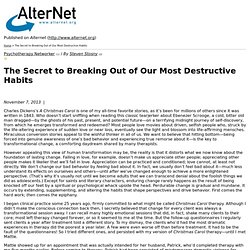
4 Things Most People Get Wrong About Memory. Human memory has been shown again and again to be far from perfect.

We overlook big things, forget details, conflate events. One famous experiment even demonstrated that many people asked to watch a video of people playing basketball failed to notice a person wearing a gorilla suit walk right through the middle of the scene. Hard-Wired to be Egotists. We want to see ourselves in a positive light so we see our own ideas as more important than the ideas of others.

How Sadness Skews our Rationality. Down in the dumps?
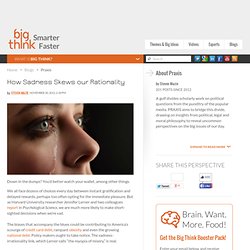
You’d better watch your wallet, among other things. We all face dozens of choices every day between instant gratification and delayed rewards, perhaps too often opting for the immediate pleasure. But as Harvard University researcher Jennifer Lerner and two colleagues report in Psychological Science, we are much more likely to make short-sighted decisions when we’re sad. The biases that accompany the blues could be contributing to America’s scourge of credit card debt, rampant obesity and even the growing national debt.
Policy makers ought to take notice. The Cheerleader Effect: Why You're More Attractive in a Group. Barney, the serial womanizer played by Neil Patrick Harris in the CBS sitcom How I Met Your Mother, knows how to pick out a hot one.

In the seventh episode of the show's fourth season, Barney complains that there are no attractive women in a bar, whereupon his friend points out a group of women in the corner. Both agree that the women are indeed attractive, but Barney knows this is simply because his brain is playing a trick on him. Teleological Reasoning: Why We Believe There is Order in Things. The Backfire Effect: Why Facts Don't Win Arguments. Let's say you're having an argument with a friend about oh, let's say, Obamacare, or even who the best quarterback in the NFL is.
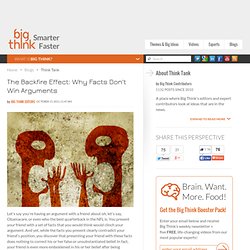
You present your friend with a set of facts that you would think would clinch your argument. And yet, while the facts you present clearly contradict your friend's position, you discover that presenting your friend with these facts does nothing to correct his or her false or unsubstantiated belief. In fact, your friend is even more emboldened in his or her belief after being exposed to corrective information. A group of Dartmouth researchers have studied the problem of the so-called "backfire effect," which is defined as the effect in which "corrections actually increase misperceptions among the group in question. " Decision Making and Cognitive Bias. Over the past 40 years, cognitive science has discovered a series of common blind spots in human decision-making.
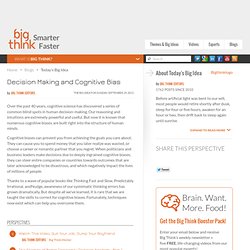
Our reasoning and intuitions are extremely powerful and useful. But now it is known that numerous cognitive biases are built right into the structure of human minds. Cognitive biases can prevent you from achieving the goals you care about. They can cause you to spend money that you later realize was wasted, or choose a career or romantic partner that you regret. When politicians and business leaders make decisions due to deeply ingrained cognitive biases, they can steer entire companies or countries towards outcomes that are later acknowledged to be disastrous, and which negatively impact the lives of millions of people.
Thanks to a wave of popular books like Thinking Fast and Slow, Predictably Irrational, andNudge, awareness of our systematic thinking errors has grown dramatically. Watch This Video, Quit Your Job, Dump Your Boyfriend. We view ourselves as rational decision-makers, and that's our first mistake. Our second mistake is that after making a mistake we continue on the same path because we refuse to accept that we were wrong, not to mention all of the time and energy we have put into a relationship, a job, or a career choice. Elizabeth Loftus: The fiction of memory. Scientists’ depressing new discovery about the brain. This article originally appeared on Alternet. Yale law school professor Dan Kahan’s new research paper is called “Motivated Numeracy and Enlightened Self-Government,” but for me a better title is the headline on science writer Chris Mooney’s piece about it in Grist: “Science Confirms: Politics Wrecks Your Ability to Do Math.”
Kahan conducted some ingenious experiments about the impact of political passion on people’s ability to think clearly. His conclusion, in Mooney’s words: partisanship “can even undermine our very basic reasoning skills…. [People] who are otherwise very good at math may totally flunk a problem that they would otherwise probably be able to solve, simply because giving the right answer goes against their political beliefs.”
In other words, say goodnight to the dream that education, journalism, scientific evidence, media literacy or reason can provide the tools and information that people need in order to make good decisions. Two Ways Neuroscience Will Impact the Law. When it comes to neuroscience and the law, there are two main topics of interest.
Collection of hampus lindwall, falling falling .com by rafaël rozendaal, 2011. sound by gloumouth1. What Can Explain the Irrationality of Those Who Have Taken American Democracy Hostage. Six Habits of Highly Empathic People. Republished from greatergood.berkeley.edu By Roman Krznaric If you think you’re hearing the word “empathy” everywhere, you’re right. It’s now on the lips of scientists and business leaders, education experts and political activists.
The Science of Better Decisions. Have you ever wanted to make better decisions? Dan Gilbert: Why we make bad decisions. Dan Ariely: Are we in control of our own decisions?